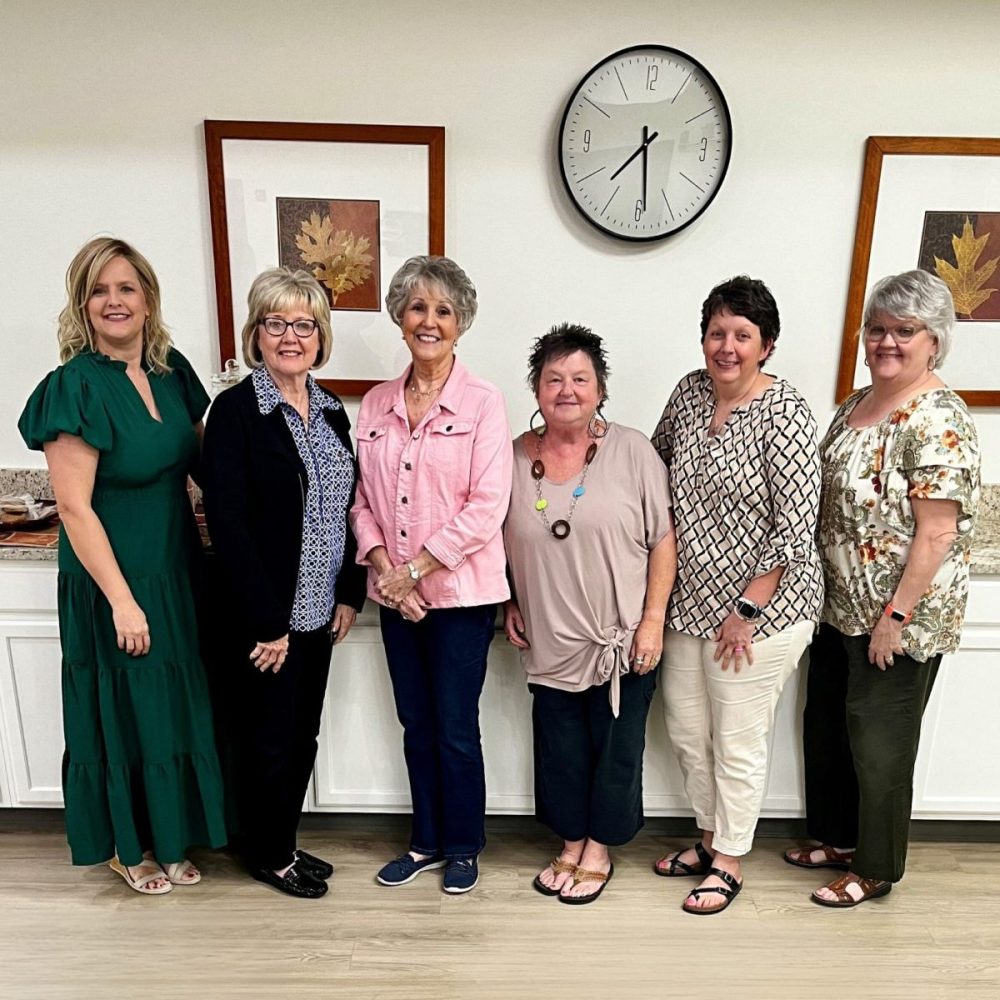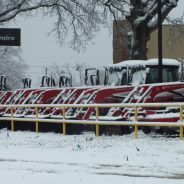Texas Agriculture Commissioner Sid Miller Announces Record Sales for GO TEXAN
Topping $1 million in sales proves the continued success of TDA’s GO TEXAN program
November 14, 2024 – Austin – Texas Agriculture Commissioner Sid Miller and the Texas Department of Agriculture (TDA) proudly announce record-breaking sales at the 2024 State Fair of Texas GO TEXAN Pavilion, sponsored by Southwest Dairy Farmers. This year’s Pavilion was a major success for GO TEXAN partners, achieving an impressive total of $1,114,895 in sales. This figure represents the combined sales of participating GO TEXAN partners and the Pioneer Brand General Store, showcasing the strength and support for Texas-made products.
“I’m proud to announce that the GO TEXAN Pavilion at the 2024 State Fair of Texas pulled in over a million bucks in sales this year,” said Commissioner Sid Miller. “That’s proof that folks want Texas-made and Texas-grown products on their tables and in their homes. These numbers are a big win for our GO TEXAN partners and prove that nothing beats Texas quality, Texas pride, and Texas independence.”
The GO TEXAN program is a TDA initiative dedicated to identifying and supporting Texas-based businesses and connecting them with customers across the Lone Star State and around the globe. The Pavilion’s GO TEXAN partners offer a diverse range of products, from coffee and salsa to houseware and healthcare items.
“GO TEXAN fosters growth opportunities for small businesses in revenue, marketing, and reputation,” Commissioner Miller said. “The mark is a seal of approval that Texas consumers trust, and the success of the program and its Pavilion at the State Fair is proof of that.”
Created in 1999, GO TEXAN promotes the products, culture, and communities that call Texas home. For more information on GO TEXAN, visit GOTEXAN.org.

Rep. Patterson Files Suite of Bills Aimed at Protecting Minors Online.
PATTERSON FILES SUITE OF BILLS AIMED AT PROTECTING MINORS ONLINE, IN SCHOOLS, AND EMPOWERING PARENTS TO DO THE SAME
November 12, 2024 – Austin, TX – As pre-filing began for the 89t Legislative Session, Texas State Representative Jared Patterson (R-Frisco) filed a suite of priority bills aimed at protecting minors online, in schools, and empowering parents to do the same.
“Heavily addictive social media platforms are destroying the lives of children in Texas. Record increases in anxiety, depression, self-harm, and suicide have coincided with the rapid rise in social media use by minors.” said Rep. Patterson. “This has been proven not only by independent third parties, but by the research conducted by the platforms themselves. Social media is the most dangerous thing our kids have legal access to in Texas.”
HB 186 filed today by Patterson restrains social media companies from conducting business with minors, requires age-verification for new users, and provides parents with the means to have a child’s account removed from the platform.
“Our kids deserve better… Last session, we made it clear that parents are the ultimate authority in charge of their child’s education. However, school district administrators have the advantage of unlimited funds for hired-gun attorneys to derail and delay efforts of parents seeking justice.” said Rep. Patterson. “Whether it’s activists pushing sexual content on Texas schoolchildren or district administrators thumbing their nose at state laws passed and supported by the People of Texas, parents will be given an equal playing field.”

Last session, Rep. Patterson passed historic legislation protecting children from sexually explicit content in public schools, named the READER Act. This law established first-ever mandatory library standards for public schools and definitions for sexual content in library materials. As legal proceedings continue on portions of the READER Act related to vendor book ratings, Rep. Patterson is doubling down by filing the following pieces of legislation.
HB 267 removes the current affirmative defense to prosecution for educational purposes known as the “obscenity exemption”. This exemption allows educators to provide sexual content to children that would otherwise be illegal to distribute to minors in Texas. Originally designed to protect educators teaching health, anatomy, biology, and for other legitimate educational purposes, the exemption is currently being used as a legal shield for groomers and activists pushing sexual content on Texas schoolchildren.
HB 183 creates a new statewide library material review process for the elected State Board of Education (SBOE). This new process provides the SBOE an ability to create rules necessary to review and approve library materials similar to how it currently approves textbooks and provides an avenue for parents to directly request a review of library materials to the state based on state standards.
HB 284 levels the playing field between parental rights and public school administrators ensuring state and federal law is followed without parents being forced to fund expensive and time-consuming lawsuits. It does so by directing the elected State Board of Education to create the position of Ombudsman. The state Ombudsman would field complaints filed by parents of public school children when state or federal law isn’t being followed and would have the authority to investigate and recommend corrective actions.
Jared Patterson represents House District 106, in Denton County. Patterson serves as Chairman of the Select Committee to Protect Texas LNG Exports and Joint-Chairman of the Study Committee on Effects of Media on Minors. He also serves on the House Committees on Calendars, Transportation, and Licensing & Administrative Procedures, and as Policy Chair of the Texas House Republican Caucus. His family resides in Frisco.
Statewide Winter Readiness Means Preparations, Partnershipss
November 14, 2024 – By Lauren Macias-Cervantes – EL PASO – The first day of winter isn’t until Dec. 21, but TxDOT maintenance crews across the state are ready for winter weather.
The readiness begins with extensive internal planning. This includes doing inventory on supply stockpiles needed to pretreat and winterize roads, making sure radio communication is in place, checking personal protection equipment, coordinating personnel schedules, and testing and calibrating equipment.
TxDOT staff in Yoakum complete a “What’s in YOUR bag” check, to make sure employees have the necessary safety equipment. Employees are also encouraged to prepare by taking care of home checklists and responsibilities.
In Bryan, Amarillo and El Paso areas, TxDOT crews began mobilizing in mid-October. In other areas, such as Dallas, Houston, Austin, Yoakum and Atlanta, crews have conducted similar preparations and are ready for response.
Every November, TxDOT’s Austin District holds a news conference and demonstration of equipment for the news media. They combine this with TxDOT’s #EndTheStreakTX campaign, providing tips for driving in wintry conditions. HERO crews join to share stories of what they see and how they help during storms.
In the Houston District winter readiness also means dry runs with law enforcement and work on water. Ferry crews make sure to have de-icing material available to place in public areas on the boats. They also make sure emergency equipment on the boats is winterized.
Coordination is key for TxDOT teams internally but for many districts neighboring other states, that also means collaboration with other state department of transportations (DOTs). This includes New Mexico DOT for the El Paso area, New Mexico DOT and Oklahoma DOT for the Amarillo area, and Arkansas DOT and Louisiana DOT for the Atlanta, Lufkin and Tyler areas.
Teams meet for a presentation by the National Weather Service, and have an opportunity to discuss their plan and exchange best practices.
Some parts of the state saw their first dose or threat of snow in early November. A severe winter storm activated Amarillo crews who pretreated then plowed roadways. Teams in El Paso also pretreated a mountain passage ahead of the warning.
“The safety for our employees and the traveling public is our priority,” said TxDOT El Paso District Engineer Tomas Treviño. “We want to be proactive, as it is critical to be ready for inclement conditions and it is safer to pretreat roads ahead of any storm.”
Crews winterize roads by applying brine, a salt and water mixture, ahead of freezing temperatures and precipitation. It is a fast-moving operation that has minimal impacts to drivers.
Ahead of winter weather, drivers will often see a convoy of trucks pretreating roadways, and they should give that mobile operation space as they work.
If a storm results in accumulation, crews use plows to clear roadways.
Motorists should not crowd the plow and should increase their distance.
While not all parts of the state will see winter weather, all are ready and may be called upon to assist in impacted areas.
As always during a winter event, the public should only travel if necessary. Road conditions can be tracked on drivetexas.org
.

Governor Abbott Prohibits College Tuition Increases In Texas
November 13, 2024 – Austin, Texas – Governor Greg Abbott today sent a letter to Texas colleges and universities prohibiting college tuition increases in the next biennium.
“When inflation and other economic pressures burden household budgets, our public universities must take every step possible to ease the financial burden on our students and their families,” reads the letter. “Last year, I signed a law that prohibits increasing undergraduate tuition and fees for both the 2023-24 and the 2024-25 academic years. As this tuition freeze expires, let me be clear: I will not support any tuition increase at any public higher education institution in the upcoming biennium. When all Texans have access to quality and affordable education, they can earn better wages, meet workforce qualifications, and experience a higher quality of life. I will ensure college affordability remains a top priority for the state as we head into the next legislative session.”

State Rep. Cain Files Universal School Choice Legislation
The Texas Parental Empowerment Act of 2025 will allow state funds to follow students to any school that serves their needs.
By Emily Medeiros – November 13, 2024 – State Rep. Briscoe Cain (R-Deer Park) has filed legislation that will offer all Texas parents greater control over their children’s education.
House Bill 212 creates a “Parent Empowerment Program” that would be administered by the Texas Comptroller. It would allow “state funds to follow students to the educational institutions that best meet their needs.”
According to the legislation, parents who choose to send their children to private schools may apply for reimbursement from the state in an amount that is the “lesser of the tuition paid; or 80 percent of the state average maintenance and operations expenditures per student.”
HB 212 specifies that money from the available school fund and federal funds may not be used to pay the program’s reimbursements, meaning the program will not be paid for by diverting funds from current government school financing.
Additionally, any savings from the program will be reinvested back into Texas public and charter schools.
Cain’s bill also states that private schools “voluntarily selected by a parent for the parent’s child to attend, with or without governmental assistance, may not be required to comply with any state law or rule governing the school’s educational program that was not in effect on January 1, 2025.”
Home schools are not mentioned in the bill, but in Texas they are considered private schools.
“Texas parents know best what works for their children, and this legislation puts that belief into action,” said Cain. “It’s time we fully recognize that children belong to their parents, not to the government, and empower Texas families with true educational choice.”
“This bill helps create a better future by allowing parents to decide the best educational setting for their child,” he concluded.
A fiscal note is not yet attached to the bill, but HB 212 authorizes the comptroller’s office to deduct up to two percent of the program’s reimbursement amounts for administrative costs.
Cain’s legislation comes days after Lt. Gov. Dan Patrick said that his top policy priority for the upcoming legislative session is school choice. Patrick also said that if Gov. Greg Abbott declares school choice one of his emergency items this session, the Texas Senate will pass school choice in the early weeks of the session.
The 89th Legislative Session is set to begin on Tuesday, January 14, 2025.

Breast Cancer Support Group Holds First Meeting in Hopkins County
November 13, 2024 – The inaugural meeting of Hopkins County’s Breast Cancer Support Group was held on Tuesday, November 12 with an excited group of women in attendance.
The highlight of the evening was a presentation by Debbie Stribling about being thankful for a cancer journey. She eloquently presented a moving piece written by Liz Curtis Higgs.
Renee Maeker presented the opening prayer, and Kristi Brewer provided a closing prayer. Carolyn McKinney and the Foundation provided refreshments and door prizes.

Discussion was held about outreach and how to best help individuals on a cancer journey. This group is acommitted to meeting each person where and how they need to be met. For those who don’t want to be part of group, a gentle card or call will be given. For those who want more information, knowledge and resources will be shared. For those who just want to be near people who have been through the experience, monthly meetings will be held. Each person’s journey is different, so the support will be unique as well.
This meeting was inspirational and reassuring.
Future meetings of the Hopkins County Breast Cancer Support Group will be held each month on the second Monday at 5:30 pm in the conference room of the Medical Plaza at 113 Airport Rd. The next meeting will be on Monday, December 9. All breast cancer patients and survivors are welcome. Women with female-related cancers are also invited.
The Foundation extends a warm thank you to the women who have made the Hopkins County Breast Cancer Support Group a reality. Their desire to serve others is heartening. To stay informed about the breast cancer support group and other offerings, please follow the Hopkins County Health Care Foundation on Facebook or Instagram.
For more information, contact the Hopkins County Health Care Foundation at 903-438-4799 or
[email protected].
Ag Commissioner Sid Miller Speaks on New International Water Agreement With Mexico
November 13, 2024 – “The newly amended water agreement between the United States and Mexico is a step in the right direction, but Texans know that promises don’t water our fields, sustain our livestock, or supply our cities. While we welcome progress to secure the state’s water supply, we need action—plain and simple.
Over the past few weeks, I’ve been in constant talks with U.S. and Mexican officials, turning up the heat on Mexico to finally make good on their commitments. On October 17, 2024, I issued an executive order allowing Texas farmers and ranchers to tap directly into the Rio Grande, and, sure enough, Mexico finally showed up at the table.

Texans take care of Texas, and we don’t wait around. We need a reliable, steady water source in our state, and I’m glad to see some action starting to take shape. This amendment to the 1944 water treaty should mean more dependable water flow from Mexico to the Rio Grande—giving well-deserved relief. I also look forward to President-elect Donald Trump taking office in January. He’s an accomplished and proven negotiator and I know he will want this matter settled once and for all.
This is Mexico’s chance to step up and cover its past shortfalls. We’ll be watching closely to ensure every promise is kept. Our cities, communities, and farmers and ranchers have earned it, and I won’t let Texas be left high and dry.”
Governor Abbott Congratulates Texas Restaurants On Earning Coveted Michelin Stars
November 12, 2024 – Austin, Texas – Governor Greg Abbott congratulated the Texas restaurants selected for the inaugural MICHELIN Guide Texas featuring 15 one-MICHELIN-Star establishments and two MICHELIN Green Star eateries. The full selection totals 117 restaurants spanning 26 cuisine types located in the greater Austin, Dallas, Fort Worth, Houston, and San Antonio areas, including Bib Gourmand restaurants, recognizing great food at a great value, and Recommended eateries.
“Michelin’s recognition of Texas’ outstanding restaurants is a testament to the world-class talent found not only in the greater Austin, Dallas, Fort Worth, Houston, and San Antonio areas, but throughout our great state,” said Governor Abbott. “The coveted MICHELIN Stars rankings will have a lasting impact on the Texas economy, bringing travelers from around the world to experience the best that Texas has to offer. More than just our world-renowned barbecue and Tex-Mex, every region of Texas offers a rich menu of flavors that draws visitors from across the globe. This is why the foodservice industry is a cornerstone of our economy, contributing more than $100 billion in sales last year and serving as the state’s largest private employer. Thank you to The MICHELIN Guide for recognizing our world-class cuisine, and congratulations to all of the chefs, restaurateurs, and their teams for helping to make Texas one of the best places in the world to live, visit, and dine.”
The MICHELIN Guide Texas was officially released at a ceremony last night hosted by Houston First with the support of Travel Texas and attended by First Lady Cecilia Abbott. Chefs and restaurant teams were honored on stage during the inaugural ceremony.
“The MICHELIN Guide Texas offers a remarkable opportunity to share our state’s culinary diversity and exceptional quality with the world,” said Travel Texas Director Tim Fennell. “Featuring our talented chefs and exceptional restaurants, the Guide encourages travelers to discover the distinct flavors and authentic dining experiences that define Texas, enhancing the state’s reputation as a premier destination for food lovers.”
“Our anonymous Inspectors were impressed by the culinary community across the state of Texas,” said International Director of the MICHELIN Guides Gwendal Poullennec. “The selection reflects their findings by highlighting uniquely Texas flavors, such as barbecue and Tex-Mex, as well as several international influences. We are very honored to welcome these restaurants to the MICHELIN Guide family for the first time, and we toast to the tremendous spirit of the Texas restaurant community.”
Read more about the MICHELIN Guide Texas.
Travel Texas, within the Governor’s Economic Development & Tourism Office, is responsible for the promotion of Texas as a premier travel destination for domestic and international visitors alike. In partnership with convention and visitor bureaus, local chambers of commerce, and private travel-related organizations and associations, Travel Texas works diligently to showcase the rich culture, history, landscapes, and experiences that Texas offers.

Texas Lawmaker Files Bill to Eliminate In-State Tuition for Illegal Aliens
November 13, 2024 – In 2001, Texas became the first state to pass legislation that allowed illegal aliens that live in Texas to receive in-state tuition.
State Rep. Terri Leo Wilson has filed House Bill 160, which would disqualify illegal aliens from receiving discounted in-state tuition when attending public colleges and universities in Texas. This subject has been recurring in the legislature for the past several years, but without progress.
“Today, I am proud to announce the filing of HB 160, the first bill filed for this upcoming legislative session, to end in-state tuition for illegal immigrants,” Willson told Texas Scorecard.
“This legislation is a top priority of the Texas GOP, and it honors the message Texas voters delivered when they elected me and other like-minded conservatives to the Texas House.”
Wilson authored similar legislation in 2023. The bill never made it beyond committee.
In Texas, public colleges and universities are able to offer a reduced tuition rate to students who reside in the state because the state subsidizes the difference with taxpayer funds. This is done to encourage students to receive their secondary education within the state.
According to research conducted by the Huffines Institute, in 2001, Texas became the first state to pass legislation that allowed illegal aliens that live in Texas to receive in-state tuition. At least 24 other states have followed the example by passing similar legislation.
Currently there are over 59,000 illegal aliens enrolled in colleges and universities across the state.
“Texans have spoken clearly: they want their taxpayer dollars safeguarded for lawful citizens. I am committed to carrying out this much needed reform while working alongside my colleagues to uphold the values Texans expect,” explained Wilson.
According to their platform, the Texas Republican Party opposes illegal aliens receiving in-state tuition, and ending the magnet is a legislative priority for the party.
Bill filing began November 12 and closes March 15th.
This article originally appeared here.

Learn What’s Going on With CANHelp and Blue Santa on this Episode of A Second Cup Of Coffee
On this episode of KSST’s A Second Cup Of Coffee With John Mark Dempsey, John Mark sat down with the Executive Director of Hopkins County CANHelp, Brian Crump. The two chatted about the coat drive currently under way, Blue Santa, and a little bit about the history of CANHelp. Brian Crump also talks about how CANHelp will extend their hours November 14th and November 21st so families may have more of an opportunity to sign up for Blue Santa. Watch this episode and learn what’s going on with Hopkins County CANHelp these days in the community.















